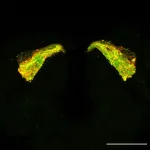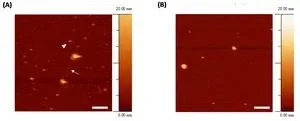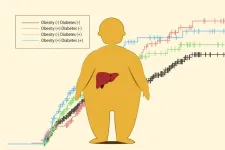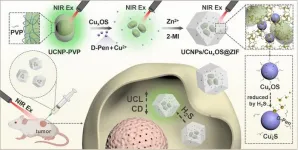(Press-News.org) EMBARGOED: NOT FOR RELEASE UNTIL THURSDAY 3 OCTOBER AT 07:00 ET (12:00 UK TIME)
An international team of researchers have made a promising breakthrough in the development of drugs to treat Alzheimer’s Disease.
For the first time, scientists have developed a drug that works on both major aggregation-promoting ‘hotspots’ of the Tau protein - addressing a critical gap in current treatments.
The drug, a peptide inhibitor called RI-AG03, was effective at preventing the build-up of Tau proteins - a key driver of neurodegeneration - in both lab and fruit fly studies.
The research, published today [3 October 2024] in Alzheimer’s & Dementia: The Journal of the Alzheimer’s Association, was undertaken by the University of Southampton in collaboration with Lancaster University, Nottingham Trent University, Tokyo Metropolitan Institute of Medical Science and UT Southwestern Medical Centre.
Dr Anthony Aggidis, lead author of the paper, Visiting Researcher at the University of Southampton and former Postdoctoral Research Associate at Lancaster University said: “Our research represents an important step toward creating treatments that can prevent the progression of diseases like Alzheimer’s disease.
“By targeting both of the key areas on the Tau protein, this unique approach could help address the growing impact of dementia on society, providing a much-needed new option for treating these devastating diseases.”
A significant breakthrough
Tau proteins play a crucial role in maintaining the structure and function of neurons (brain cells). But in Alzheimer's disease, these proteins malfunction, clumping together to form long, twisting fibrils.
As the fibrils accumulate, they create what are called neurofibrillary tangles - masses of twisted Tau proteins that clog the neurons, preventing them from getting the nutrients and signals they need to survive.
As more neurons die, memory, thinking, and behaviour become increasingly impaired, leading to the cognitive decline seen in Alzheimer’s.
There are two specific ‘hotspots’ of the Tau protein where this clumping tends to happen. While current treatments target one or the other of these hotspots, RI-AG03 uniquely targets and blocks both.
“There are two regions of the Tau protein that act like a zipper to enable it to aggregate,” says Amritpal Mudher, Professor of Neuroscience at the University of Southampton and one of the lead authors on the paper.
“For the first time, we have a drug which is effective in inhibiting both these regions. This dual-targeting mechanism is significant because it addresses both domains that stimulate Tau aggregation, potentially paving the way for more effective treatments for neurodegenerative diseases like Alzheimer’s.”
Targeted approach
The peptide-based approach is also more targeted than current treatments, potentially making it safer, with fewer side effects.
“We know that the toxicity of the Tau protein is intimately linked with its ability to aggregate, so by inhibiting aggregation we expect to see desirable effects,” says Dr Aggidis.
“But current aggregation inhibitors have had many side effects because they can interfere with the functions of many other proteins.
“RI-AG03 is specifically designed against the Tau protein, meaning it’s less likely to undesirably interact with other proteins.”
Testing RI-AG03
The paper describes how RI-AG03 was first developed by Dr Aggidis, in the laboratory of the late Prof David Allsop, using computational biology at Lancaster University, where it was tested in lab dishes.
To test its effectiveness in cells within a living organism, researchers at the University of Southampton then gave the drug to fruit flies that had pathogenic Tau. These fruit fly models of Alzheimer's Disease were generated by Dr Shreyasi Chatterjee who is a Senior Lecturer at Nottingham Trent University.
The researchers found the drug suppressed neurodegeneration and extended the lives of the flies by around two weeks – a significant extension considering the life span of the insects.
To understand what was happening, Southampton’s scientists looked deep into the brains of the fruit flies.
Prof Mudher said: “When we didn’t feed the flies with the peptide inhibitor, they had lots of the pathogenic fibrils, which group together to make up a tangle. But when we fed them with the drug, the pathogenic fibrils decreased significantly in quantity.”
“The higher the dosage given, the greater the improvement we saw in the fruit fly’s lifespan.”
To make sure this wasn’t unique to fruit flies, researchers at UT Southwestern Medical Centre tested the drug in a biosensor cell - a type of living human cell line that is engineered to detect pathogenic tau fibril formation.
Here too, they found the drug successfully penetrated the cells and reduced the aggregation of Tau proteins.
The team believe their work will have a significant impact on drug discovery efforts in the field of neurodegenerative diseases and now plans to test RI-AG03 in rodents, before proceeding to clinical trials.
The research was funded by the Alzheimer’s Society. Dr Richard Oakley, Associate Director of Research and Innovation, said: “Dementia is the UK’s biggest killer, and it applies enormous cost and pressure to our healthcare system which is why we’re committed to funding world leading studies like this one.
“This research is taking promising steps towards a new one-of-a-kind therapy which targets Tau, a damaging protein in the brains of people living with Alzheimer’s, preventing it from clumping together. This drug has the potential to be more targeted than others currently being studied, and we hope it will result in fewer toxic side effects.
“It’s important to note that the study is in its early stages, so we don’t yet know if it will work or be safe for humans, but it’s an exciting development and we look forward to seeing where it leads.
“Research will beat dementia, but we need to make it a reality sooner through more funding, more partnerships, and more people taking part in dementia research. To find out about Alzheimer’s Society research or to take part visit alzheimers.org.uk/research.”
A novel peptide-based Tau aggregation inhibitor as a potential therapeutic for Alzheimer’s disease and other Tauopathies is published in Alzheimer’s & Dementia: The Journal of the Alzheimer’s Association and is available online.
Ends
Contact
Steve Williams, Media Manager, University of Southampton, press@soton.ac.uk or 023 8059 3212.
Notes for editors
A novel peptide-based Tau aggregation inhibitor as a potential therapeutic for Alzheimer’s disease and other Tauopathies is published in Alzheimer’s & Dementia: The Journal of the Alzheimer’s Association. An advanced copy of the paper is available upon request.
For Interviews with Prof Amritpal Mudher and Dr Anthony Aggidis, please contact Steve Williams, Media Manager, University of Southampton press@soton.ac.uk or 023 8059 3212.
Images are available here: https://safesend.soton.ac.uk/pickup?claimID=4rUiQkcBup2i4Guh&claimPasscode=4DDwKKZedfzthuwa
Captions:
The brain of a 7-day-old fruit fly with Tau expressed in a neuronal circuit used by the fly in olfactory memory. The green outlines the neurons, which are starting to swell and degenerate due to the Tau protein. The red shows where Tau is building up in clusters along the neurons, starting to form the clumps that eventually become rope-like fibrils.
Scientists used a special imaging technique to observe how Tau protein clumps in the brain tissue of genetically modified flies in response to treatment with RI-AG03. Without the treatment (A), they saw toxic clumps of Tau fibrils (arrow) and oligomers (arrowhead). After treatment (B), those harmful clumps disappeared, and only large round structures remained, which the scientists believe are less harmful.
Additional information
The University of Southampton drives original thinking, turns knowledge into action and impact, and creates solutions to the world’s challenges. We are among the top 100 institutions globally (QS World University Rankings 2025). Our academics are leaders in their fields, forging links with high-profile international businesses and organisations, and inspiring a 22,000-strong community of exceptional students, from over 135 countries worldwide. Through our high-quality education, the University helps students on a journey of discovery to realise their potential and join our global network of over 200,000 alumni. www.southampton.ac.uk
www.southampton.ac.uk/news/contact-press-team.page
Follow us on X: https://twitter.com/UoSMedia
END
Promising ‘first’ in Alzheimer’s drug development
New drug successfully blocks both Tau aggregation ‘hotspots’ for the first time
2024-10-03
ELSE PRESS RELEASES FROM THIS DATE:
Quantum researchers come up with a recipe that could accelerate drug development
2024-10-03
University of Copenhagen mathematicians have developed a recipe for upgrading quantum computers to simulate complex quantum systems, such as molecules. Their discovery brings us closer to being able to predict how new drugs will behave within our bodies and has the potential to revolutionize pharmaceutical development.
Developing a new drug can take more than a decade and cost anywhere from hundreds of millions to billions of euro — with multiple failed attempts along the way. But what if we could predict how a drug worked ...
Experts publish the latest guide for systematic reviews of preclinical research
2024-10-03
A new publication in Nature Reviews Methods Primers provides essential guidance for conducting rigorous systematic reviews on studies with animals and cells. It also highlights the benefits of these reviews, such as improving reproducibility and reducing animal use, and addresses potential pitfalls and recent advancements like review automation.
Systematic reviews synthesize existing evidence in a scientific field to answer specific research questions in a structured and unbiased way. With over 100 million animals used in scientific ...
Oyster reefs once thrived along Europe’s coasts – now they’re gone
2024-10-03
Oysters once formed extensive reefs along much of Europe's coastline – but these complex ecosystems were destroyed over a century ago, new research shows.
Based on documents from the 18th and 19th Centuries, the study reveals that European flat oysters formed large reefs of both living and dead shells, providing a habitat supporting rich biodiversity.
Today these oysters are mostly found as scattered individuals – but the researchers found evidence of reefs almost everywhere, from Norway to the Mediterranean, covering at least 1.7 million hectares, an area larger than Northern Ireland.
The research was ...
Decades-long research reveals new understanding of how climate change may impact caches of Arctic soil carbon
2024-10-03
Utilizing one of the longest-running ecosystem experiments in the Arctic, a Colorado State University-led team of researchers have developed a better understanding of the interplay among plants, microbes and soil nutrients — findings that offer new insight into how critical carbon deposits may be released from thawing Arctic permafrost.
Estimates suggest that Arctic soils contain nearly twice the amount of carbon that is currently in the atmosphere. As climate change has caused portions of Earth’s northernmost polar regions to thaw, scientists have long been concerned about significant amounts of carbon being released in the ...
How Soviet legacy has influenced foreign policy in Georgia and Ukraine
2024-10-03
The legacy of the Soviet Union’s collapse plays a greater role in the foreign policies of Georgia and Ukraine than previous studies have suggested. Conducting foreign policy in former Soviet countries can be a major challenge as the Russian state does not accept the new order. These are the findings outlined in the thesis of political scientist Per Ekman from Uppsala University.
“To understand Russia’s war in Ukraine, for example, it is important to see the war as part of a longer historical event. Since their first day of independence, Georgia and Ukraine have had to deal with Russian ambitions to control the region. For many in the West, it took a ...
Robin Dunbar: Pioneering evolutionary psychologist redefines human social networks
2024-10-03
Oxford, UK – Genomic Press has released a captivating interview with Professor Robin Dunbar, the eminent evolutionary psychologist and anthropologist whose work has fundamentally altered our understanding of human social networks. Published in the Innovators and Ideas section of Genomic Psychiatry, this in-depth conversation offers unique insights into Professor Dunbar's scientific journey and the far-reaching implications of his research.
Professor Dunbar, best known for conceptualizing "Dunbar's number" - the cognitive limit to the number of stable social relationships ...
Balancing health: diabetes and obesity increase risk of liver cancer relapse
2024-10-03
Hepatocellular carcinoma, a type of liver cancer associated with hepatitis infections, is known to have a high recurrence rate after cancer removal. Recent advances in antiviral therapy have reduced the number of patients affected, but obesity and diabetes are factors in hepatocellular carcinoma prevalence. However, these factors’ effects on patient survival and cancer recurrence have been unclear.
To gain insights, Dr. Hiroji Shinkawa’s research team at Osaka Metropolitan University’s Graduate School of Medicine analyzed the relationship between diabetes mellitus, obesity, and postoperative outcomes in 1,644 patients with hepatocellular carcinoma ...
Duke-NUS launches new pictograms to clarify medication instructions, enhancing patient care
2024-10-03
Duke-NUS introduces 35 innovative pictograms to make medication instructions clearer, especially for seniors.
These visual aids are designed to ensure patients take their medications correctly and safely, with the aim of improving overall health outcomes.
The team looks to collaborate with healthcare institutions and pharmacies to standardise pictograms portraying medication instructions across Singapore.
SINGAPORE, 3 OCTOBER 2024 – Transforming patient care through clarity and simplicity, Duke-NUS Medical School has introduced visual aids or pictograms designed to make medication instructions clearer. ...
Chiral nanocomposite for highly selective dual-mode sensing and bioimaging of hydrogen sulfide
2024-10-03
With the continuous development of nanotechnology, more artificial chiral nanomaterials have been constructed. As one of the most representative optical properties of these chiral nanomaterials, CD is a powerful sensing technology. Compared with other analytical methods, CD signal has higher sensitivity, but it cannot achieve in-situ imaging in vivo. Scientists have managed to prepare chiral nanocomposites with more diverse biological functional properties to compensate for this shortcoming. However, some chiral nanocomposites assembled by electrostatic adsorption or other methods are easily dissociated and destroyed in complex physiological environments, resulting in performance ...
UCLA researchers develop new risk scoring system to account for role of chronic illness in post-surgery mortality
2024-10-03
FINDINGS
A UCLA research team has created the Comorbid Operative Risk Evaluation (CORE) score to better account for the role chronic illness plays in patient's risk of mortality after operation, allowing surgeons to adjust to patients’ pre-existing conditions and more easily determine mortality risk.
BACKGROUND
For almost 40 years, researchers have used two tools, the Charlson Comorbidity Index (CCI) and Elixhauser Comorbidity Index (ECI), to measure the impact of existing health conditions on patient outcomes. These tools use ICD codes that are input by medical professionals and billers to account for patient illness. These ...
LAST 30 PRESS RELEASES:
A promising potential therapeutic strategy for Rett syndrome
How time changes impact public sentiment in the U.S.
Analysis of charred food in pot reveals that prehistoric Europeans had surprisingly complex cuisines
As a whole, LGB+ workers in the NHS do not experience pay gaps compared to their heterosexual colleagues
How cocaine rewires the brain to drive relapse
Mosquito monitoring through sound - implications for AI species recognition
UCLA researchers engineer CAR-T cells to target hard-to-treat solid tumors
New study reveals asynchronous land–ocean responses to ancient ocean anoxia
Ctenophore research points to earlier origins of brain-like structures
Tibet ASγ experiment sheds new light on cosmic rays acceleration and propagation in Milky Way
AI-based liquid biopsy may detect liver fibrosis, cirrhosis and chronic disease signals
Hope for Rett syndrome: New research may unlock treatment pathway for rare disorder with no cure
How some skills become second nature
SFU study sheds light on clotting risks for female astronauts
UC Irvine chemists shed light on how age-related cataracts may begin
Machine learning reveals Raman signatures of liquid-like ion conduction in solid electrolytes
Children’s Hospital of Philadelphia researchers emphasize benefits and risks of generative AI at different stages of childhood development
Why conversation is more like a dance than an exchange of words
With Evo 2, AI can model and design the genetic code for all domains of life
Discovery of why only some early tumors survive could help catch and treat cancer at very earliest stages
Study reveals how gut bacteria and diet can reprogram fat to burn more energy
Mayo Clinic researchers link Parkinson's-related protein to faster Alzheimer's progression in women
Trends in metabolic and bariatric surgery use during the GLP-1 receptor agonist era
Loneliness, anxiety symptoms, depressive symptoms, and suicidal ideation in the all of us dataset
A decision-support system to personalize antidepressant treatment in major depressive disorder
Thunderstorms don’t just appear out of thin air - scientists' key finding to improve forecasting
Automated CT scan analysis could fast-track clinical assessments
New UNC Charlotte study reveals how just three molecules can launch gene-silencing condensates, organizing the epigenome and controlling stem cell differentiation
Oldest known bony fish fossils uncover early vertebrate evolution
High‑performance all‑solid‑state magnesium-air rechargeable battery enabled by metal-free nanoporous graphene
[Press-News.org] Promising ‘first’ in Alzheimer’s drug developmentNew drug successfully blocks both Tau aggregation ‘hotspots’ for the first time








